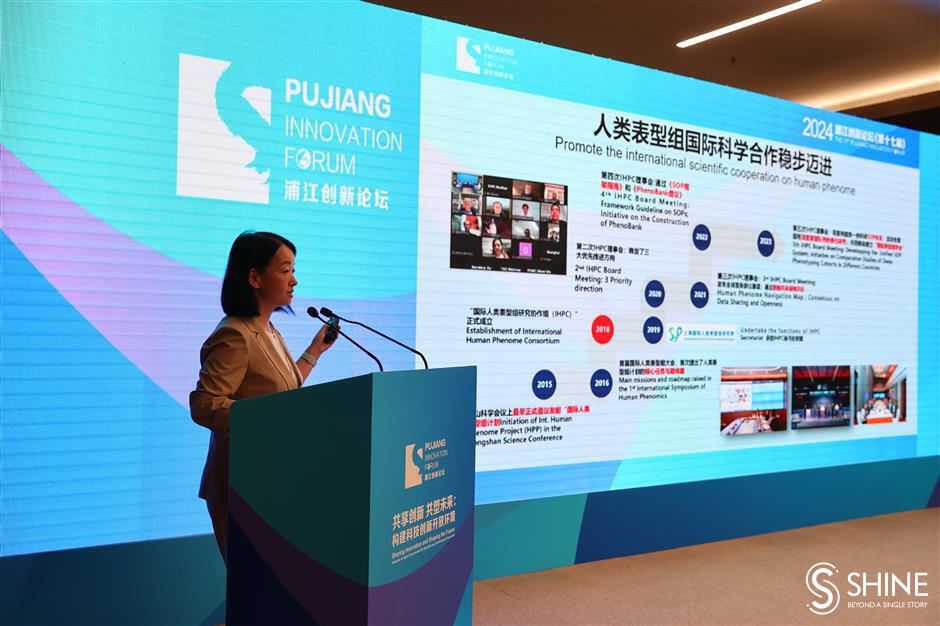
Shot by Jiang Xiaowei. Edited by Jiang Xiaowei. Subtitles by Jiang Xiaowei.
Shanghai residents aged 20 to 60 are healthier than their peers elsewhere, shedding light on the human phenome – a study of biological traits from birth to old age – according to new research revealed at the 2024 Pujiang Innovation Forum.
The human phenome study aims to explore how genetic and environmental factors converge to shape our health.
By examining these interactions, scientists hope to uncover key links between diseases, environmental influences, and various traits, potentially leading to breakthroughs in our understanding and enhancement of human health.
During the forum’s “International Human Phenome Forum” sub-forum, Leroy Hood, a pioneer in systems biology, praised China’s leadership in phenomics research, putting Shanghai among the top global centers for phenomics alongside Seattle and Tel Aviv.
The International Human Phenome Consortium (IHPC), launched in Shanghai in 2018, has now expanded to include 23 institutions and teams from 20 countries.
This growth underscores the increasing global recognition of the International Human Phenome Project, a major initiative led by Chinese scientists aimed at advancing our understanding of health and disease through detailed analysis.
 Jiang Xiaowei / SHINE
Jiang Xiaowei / SHINE
Tian Mei, president of the Human Phenome Institute at Fudan University.
The project has achieved several significant milestones: establishing the world’s first detailed human phenome measurement platform, creating the inaugural global human phenome map, and conducting a core study measuring 24,000 traits across more than 1,400 participants.
This is a pioneering effort in precision phenotyping.
Research team led by Jin Li, president of Fudan University, has assembled a substantial dataset, including 4.5 petabytes of core data and an additional 1 petabyte of specialized data. Their research covers a wide range of topics, from early-onset coronary heart disease to aging and dietary interventions.
At the sub-forum, Tian Mei, president of the Human Phenome Institute at Fudan, reported that their research has identified notable variations in traits with age.
“Comparing data on body mass index, blood sugar, and blood pressure among different populations, the study found that Shanghai residents aged 20 to 60 generally exhibit better health,” she said.
She emphasized that this research highlights the need for health standards specifically tailored to the Chinese population.
Additionally, the Chinese edition of Hood’s influential book “The Age of Scientific Wellness” was unveiled at the sub-forum.
Hood, a trailblazer in automatic DNA sequencing, introduced the world’s first automatic DNA sequencer in 1986–a breakthrough that laid the foundation for human genome sequencing and marked the dawn of genetic research.
 Jiang Xiaowei / SHINE
Jiang Xiaowei / SHINE
The Chinese edition of Leroy Hood’s book “The Age of Scientific Wellness” is unveiled.
In 2014, Hood and his team conducted a comprehensive study with 108 researchers, collecting extensive data on genes, proteins, metabolism, and gut microbiota, alongside lifestyle and environmental factors.
The study found that while genetics play a crucial role in health, they are not the only factor. For optimal health outcomes, individuals should tailor their diet, exercise, and supplements based on their genetic information, adopting more precise disease prevention strategies.
Hood believes the International Human Phenome Project represents a revolutionary, data-driven approach to health.
This approach involves detailed assessments of the human genome and phenome, targeting nutritional deficiencies, correcting biochemical imbalances, and improving physiological aging and metabolism before symptoms emerge.
Hood views this data-driven approach as one of the most significant shifts in medicine to date.
Addressing the sub-forum, he said: “What I will tell you is that AI will be crucial in the future”.
He elaborated that AI will analyze genome and phenome data to provide actionable insights tailored to individuals, which will then be delivered to physicians. This will enable doctors to become experts in various medical domains, transforming patient care in ways previously thought impossible.
